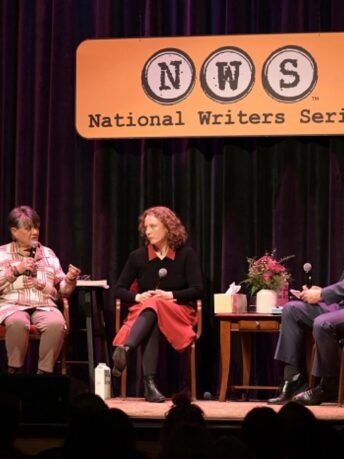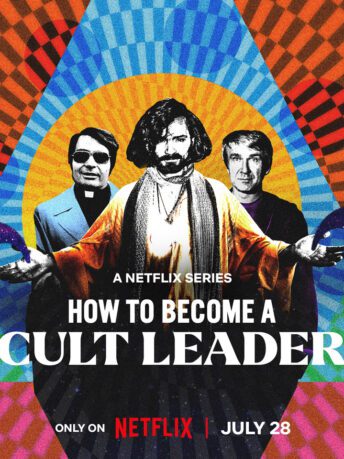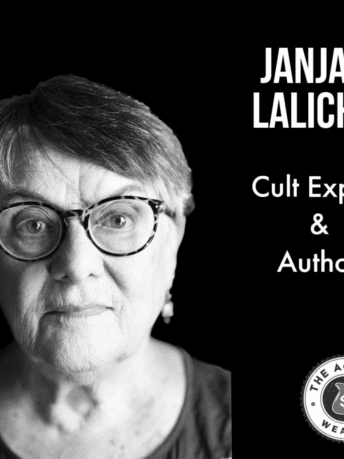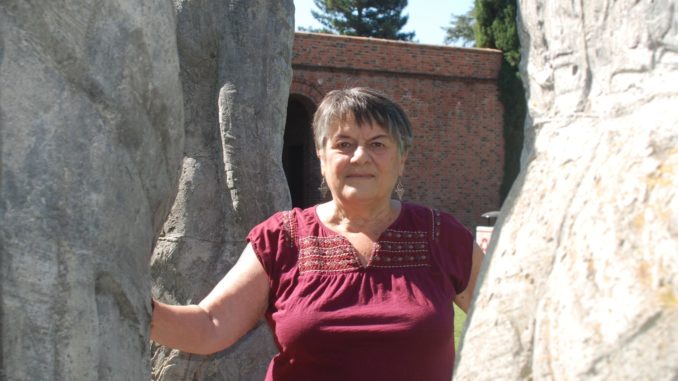
FORMER CHICO STATE PROFESSOR AND CULT EXPERT JANJA LALICH ON NXIVM DOCUMENTARIES, TRUMP AND QANON
Originally published on Chico News & Reviews.
Since teaching her last class at Chico State in June 2018, Janja Lalich—professor emerita of sociology and a preeminent expert on cults—has not eased her way into retirement.
“I’m actually way too busy,” she told the CN&R with a chuckle during an interview Thursday afternoon (Oct. 15).
She’s conducted numerous media interviews and served as an expert witness in court. Every other Saturday, starting this spring, she’s co-facilitated Zoom workshops for former cult members with Marin-based therapist Colleen Russell. Lalich also just completed the first draft of a memoir, for which she’s seeking a publisher or agent.
Her work getting the most attention now: two documentaries on NXIVM (pronounced NEX-ee-um)—an ostensible self-help organization that masked the sex-slave group DOS at its core. The Vow wraps with its ninth episode Sunday (Oct. 18) on HBO (though it has a greenlight for a second season), and Seduced: Inside the NXIVM Cult debuts the same night on Starz with the first of four episodes.
Producers of both projects consulted Lalich. She attended the last two weeks of the trial where, in June 2019, cult head Keith Raniere was convicted on seven criminal counts including racketeering and sex trafficking. Members of his inner circle, including actress Allison Mack of Smallville fame and Seagram heiress Clare Bronfman, pled guilty and also face jail time.
The Vow traces the 20-year history of NVIXM through the eyes of numerous members and actual footage from the inside. Seduced focuses on India Oxenberg whose mother, actress Catherine Oxenberg, fought to extricate her from the cult. Lalich got to know the Oxenberg family as well as whistleblowers who shared their stories—and scars—for a 2017 New York Times article that sparked the FBI investigation that brought down Raniere.
By phone from Walnut Creek, where she moved 18 months ago, Lalich spoke about NXIVM, the documentaries, meeting royalty and parallels to cults in the current political landscape.
When and how did NXIVM get on your radar?
I knew minimally about NXIVM over the years, and in particular because they hounded someone else who works in this field [cult deprogrammer Rick Ross]—I knew they were harassing him, filing lawsuits against him, things like that. But then I really got interested, of course, when the story broke in The New York Times; that’s when Sarah Edmondson, who ran [NXIVM’s] Vancouver center, came forward and was on the front page showing the branding they were doing on women’s pelvic areas for the women who were part of that secret cult within a cult. That’s when I got a lot more interested and a lot of people started contacting me, and shortly after that the documentaries started.
When Keith Raniere was arrested and put on trial, I went to New York for the last two weeks of the trial in the federal courthouse in Brooklyn. That was fascinating.

Did you go as part of your participation in the documentaries, or for your own edification?
As part of the documentaries. I already had been working with both those film crews before the trial; also with them at the trial and afterwards. I stayed at an Airbnb in Brooklyn with four or five women who had been part of the group, so that was really fascinating, because we just talked and talked and talked.
Any of those women we have seen or will see?
Yes, absolutely, some of those very key women, some of the early whistleblowers who left in 2009 and tried to raise awareness, and then the people who blew the whistle in The New York Times’ article, and then Catherine Oxenberg, who got involved trying to get her daughter out.
I also met with her while I was in New York [previously] and tried to work with her to try to get her daughter out—and met Princess Elizabeth of Yugoslavia, who’s Catherine’s mother, which was very exciting for me because I’m of Serbian descent.
Under the circumstances, were you able to enjoy the moment as it happened?
It was a moment at the time. It really wonderful. I saw them more than once, and I have great photos of us together. It was a moment in my life, absolutely.
Are you watching The Vow now, or did you already see it during the editing or production phase?
No, I didn’t see any of it before, because they’re in New York and I’m obviously out in California—so I’ve only been watching it like everybody else.
What’s been your reaction?
The two documentaries are really quite different and complement each other. What’s most amazing to me in the The Vow is the amount of real-time footage that they have of things inside the group: of Keith Raniere speaking, of people being inside various workshops. So you’re kind of following the stories of [whistleblower couples] Mark [Vicente] and Bonnie [Piesse] and Sarah [Edmondson] and Nippy [Ames]; also you really see the manipulative dynamic that goes on because they have so much original footage. …
The one coming out this week focuses more on Catherine trying to get her daughter out, everything she did, and India actually coming out of the group and talking about her experience. It’s really quite moving.
They’re very different in their technique and their approaches, and they’re both very powerful. I think it’s so great that these documentaries are coming out now to help educate the public about these groups.
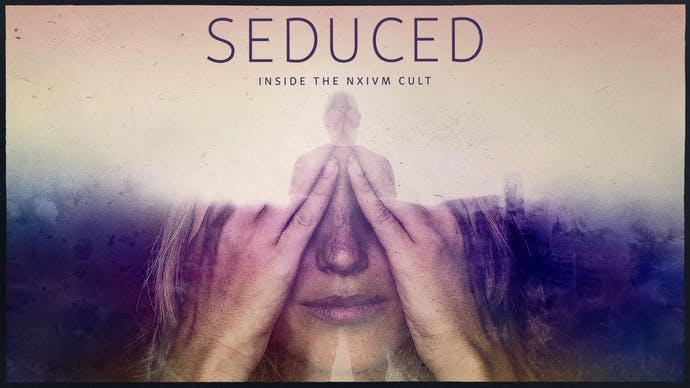
What do you hope people take away from watching these documentaries?
Several things. I’m hoping that, for one, viewers will begin to have a better understanding of who joins these groups. I think there’s always been a feeling that Oh, it’s just “stupid people,” “crazy people” or “weak people” who get into these groups. You can see from these documentaries—and many of the others that have come out recently—that’s not who cults recruit. Cults recruit smart people, A-type personalities; they want people who can run their businesses and keep the thing going and recruit and bring in celebrities and bring legitimacy to the group. I hope the public will see these are decent, good people who join these groups, and if there’s any common denominator, it’s idealism: people who want to create a better world or do something better for their families. That’s what cults prey on.
Then, I also hope people will see how easy it is to get manipulated, to have this kind of gaslighting happen, where in many ways you’re very subtly coerced into joining and doing things you wouldn’t normally do. Membership in these groups tends to change your moral compass and your value structure—that takes determination on the part of the cult, and it takes indoctrination. I’m hoping these two documentaries will help the public understand how easily that happens and how deeply it harms people, how deeply it affects victims of that kind of cult regime.
We hear about gaslighting with how the public is being manipulated by politicians, and terms like Trump Derangement Syndrome and the Trump Cult. Are there parallels you see to your work?
At least from my point of view, Trump has really done an excellent job of turning people away from reality. And he’s created his own version of reality. This whole focus on not believing in science, resisting that there’s any kind of climate change, insisting that “oh, the coronavirus really isn’t all that bad”—all these things over the last four years have appealed to certain people who have then become this frenzied 40 percent as they’ve become referred to, “the 40 percent,” who will, as we’ve seen, even put their lives at risk to attend these Trump rallies.
For me, what I feel I’m witnessing is the same close-mindedness that I see when I study cults: that the members are kind of shut into this bubble world and they’re very hard to speak to rationally and they don’t want to entertain any ideas that conflict with what they believe in. I think we’re seeing that a lot right now. And also with the QAnon movement that’s become so popular, we’re seeing families that have been completely disrupted by people who have become so closed in their thinking.
The dangers I see, especially with QAnon and even some of the things Trump has said, is violence that can so easily erupt among that population. To me, that’s what’s troubling. Most cults are insular and do harm among their members, but most cults don’t act outward. Surely some cults have, like Charlie Manson, over the years, but most cults don’t do that. What’s different now with QAnon and some of the white supremacist groups and some of that extremism is the acting out: walking around with guns, threatening to kidnap governors. That has been given license by some of the rhetoric from the administration.

Is there any antidote?
We can never give up hope. There certainly is no magic bullet; with every individual and family situation, it’s going to be different. But I think some of the actions that are happening now with Facebook and Twitter, some of these social media outlets that are shutting down some of the disinformation that QAnon has been putting out, hopefully dampens some of the enthusiasm and it won’t be available to so many people to latch onto.
It’s difficult, because our country is in a very unsettling time right now. People don’t know what’s going on. Sometimes it feels like everything’s coming apart, right? Sometimes I even feel that way! When societies are in that unsettling kind of environment, that’s when cults can recruit; that’s when people tend to grasp at things that offer them some framework, offer them some answers, provide them some calm, some way to understand what’s going on. Until we can settle out the environment in America, we’re going to see a lot of this happening. Perhaps with a change in administration, we can begin to settle some of these crisis areas.

